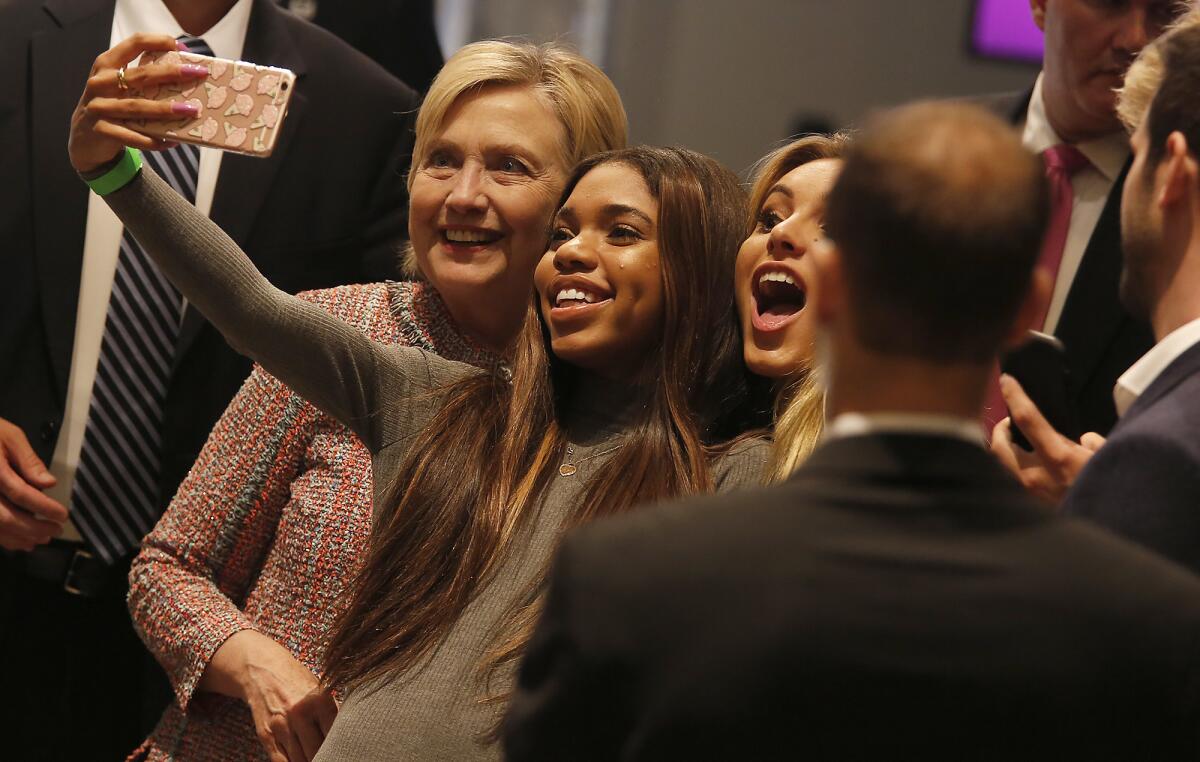In Hollywood, Hillary Clinton looks to the future and brushes aside the past

For Hillary Clinton, the driving imperative of the presidential campaign is to focus voters on the future, the candidacy of Donald Trump and her myriad policy plans -- and away from the controversies of the past.
But on Tuesday, the past and the future collided in a big way as Clinton campaigned in Denver and Los Angeles, discussing technology proposals meant to spur entrepreneurial activity and increase the nation’s Internet savvy.
The first collision came with the release of the Republican report on the killings of four U.S. citizens in Benghazi, Libya, one of the low points of Clinton’s tenure as secretary of State. The second arrived via Trump, denouncing in Pennsylvania trade policies backed by Hillary Clinton in the 1990s.
Clinton stayed relentlessly focused forward in Hollywood, where she answered questions Tuesday evening from a mostly millennial audience of Web entrepreneurs, and but for a brief comment on the Benghazi report, in Denver as well.
The young voters in Hollywood asked nothing about trade or Benghazi but did delve into other aspects of her past -- her 2002 vote for the Iraq war and her support for a 1990s crime bill seen by some in the African American community as overly punitive.
In a slightly tart response to questioner Whitney White, who asked in a reference to the crime bill how Clinton would “win back the trust” of the black community, Clinton described at length her service dating back decades to organizations helping blacks and Latino Americans.
She said that while she wanted to be accountable for her positions, “I also do respectfully ask that people know a little more about what I have done.”
Aiming at the future has been a recurring theme for Clinton, underscoring her argument that Trump is headed backward. As she put it in Hollywood, “We are a future-oriented society. America has always been about the future.”
Looking forward also serves to distance Clinton from controversies past and present, such as the dispute over her use of a private email server as secretary of State and her speeches to Wall Street executives after she left the Obama administration.
In Hollywood and earlier in Denver, Clinton laid out a technology plan that, among other components, called for a three-year moratorium on college loan repayments, and student loan refinancing, for those seeking to build a business.
“If you get that enterprise up and going, we want to forgive a portion of that debt because you’ve become a job creator,” she said in Denver.
She also repeated earlier proposals for high-speed Internet in every American household and business within the decade, and for technology and computer education in every school.
Republicans, meantime, sought in multiple ways Tuesday to remind voters of the past.
The Benghazi report by Republicans in Congress accused the Obama administration, including Clinton’s State Department, of neglecting to properly protect U.S. Ambassador J. Christopher Stevens and three other men. The report did not identify any new wrongdoing by Clinton; the committee’s lasting damage to her may be its discovery that Clinton used a private email system while in the Cabinet, a matter still under investigation.
Clinton, asked about the report in Denver, said that important changes to U.S. security procedures had been made in the years since the 2012 attack.
“So, I’ll leave it to others to characterize this report, but I think it’s pretty clear that it’s time to move on,” she said.
Trump’s assault during a visit to an aluminum factory in Monessen, Pa., was, if anything, more lancing, aiming as it did on a potent issue in the industrial Midwest: the impact of trade policies put into effect during Bill Clinton’s administration.
Trump said the loss of manufacturing jobs -- “this catastrophe” -- rested on the North American Free Trade Agreement, or NAFTA, and China’s entry into the World Trade Organization.
“NAFTA was the worst trade deal in the history, like the history of this country, and China’s entrance into the World Trade Organization has enabled the greatest jobs theft in the history of our country,” he said, declaring that the Clintons left behind “havoc.”
Clinton returned the criticism in Hollywood on Tuesday evening, after one questioner at the millennial gathering asked what she would say to a Trump supporter.
Clinton said that she understood -- and had sympathy for -- Americans fearful because jobs “that gave you a good living” were gone.
“I am not sympathetic to the xenophobia, the misogyny, the homophobia, the Islamophobia and all the other sort of dog whistles that Trump uses to create that fervor among a lot of his supporters,” she said.
Trump, she repeated, was fixed on the past.
“I understand why people are frustrated and even fearful, but don’t look for easy answers and misleading promises that cannot deliver what you’re hoping for,” she said. “The whole slogan ‘Make America Great Again’ is code for go back to a time when a lot of people were not included.”
Twitter: @cathleendecker
MORE POLITICAL COVERAGE
Updates on California politics
Live coverage from the campaign trail
Initiative to legalize recreational use of pot in California qualifies for November ballot
Donald Trump vows to punish China and end major trade deals
More to Read
Get the L.A. Times Politics newsletter
Deeply reported insights into legislation, politics and policy from Sacramento, Washington and beyond. In your inbox three times per week.
You may occasionally receive promotional content from the Los Angeles Times.











